#no reason for posting this whatsoever
Photo

his wolfsona that he’s very proud of
#he's gonna post it on deviantart#the wolf has a 'cloned in a lab backstory' (no reason whatsoever)#the owl house#toh art#hunter toh#hunter noceda#hunter#toh hunter#hunter wittebane#my art#fanart#toh#this is not a full art but i'm swamped with school and zine work so kxjsjsk
8K notes
·
View notes
Text
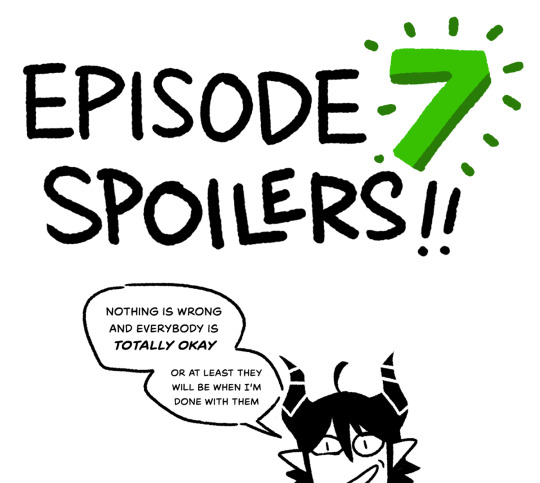

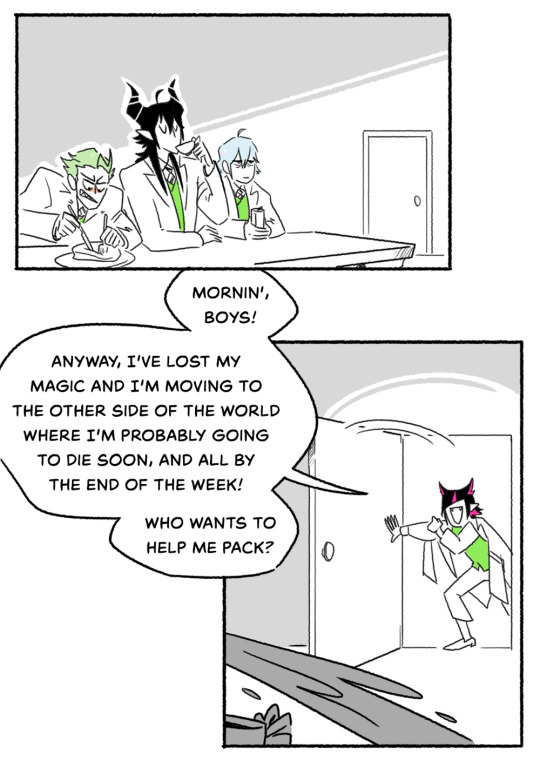

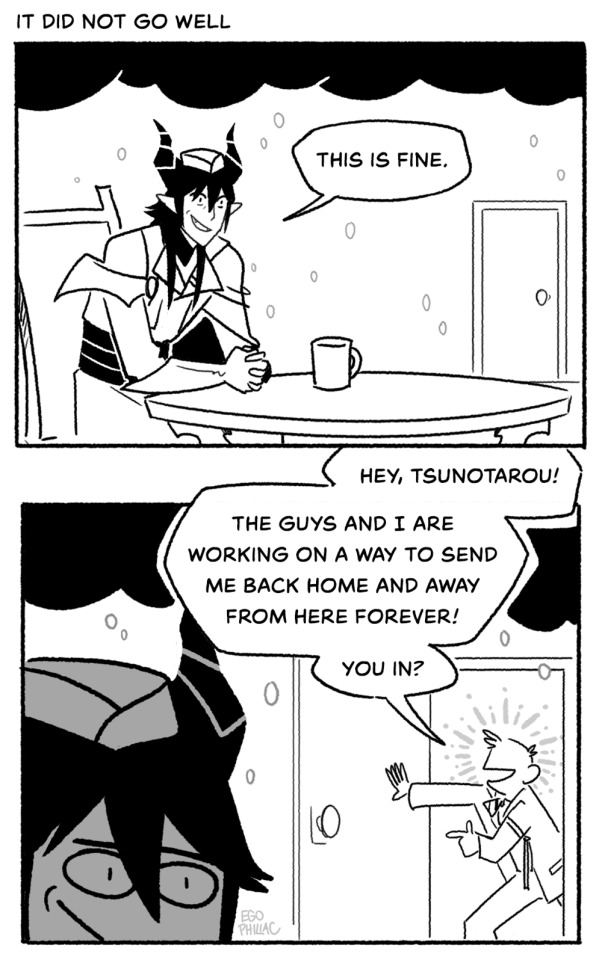


(it probably wasn't actually Idia's fault)
(or was it)
some quick initial reactions to celebrate Diasomnia Day One! it felt like a bit of a short intro, but oh, what a tasting menu of things to come.

#art#long post#twisted wonderland#twisted wonderland spoilers#twisted wonderland episode 7 spoilers#twisted wonderland book 7 spoilers#it's been thirty seconds and already#lilia is sending himself to a farm upstate where he'll have lots of rabbits to chase#malleus does a whole flashback to his most embarrassing childhood memory#ponytail lilia CONFIRMED we have a CONFIRMED SIGHTING everybody#idia does a surprisingly good crowley impression. this is not important to the plot but it's important to me personally.#also silver is probably a cursed prince or something WHO CARES look at these COOL ACORNS#the mental image of silver and lilia having that little heart-to-heart about the ring#while sebek is five feet away sorting laundry#absolutely incredible#meanwhile yuu continues to just have no survival instinct whatsoever#if a horned man approaches you at midnight and goes 'wouldn't it be nice if we never had to say goodbye to anyone ever?' DO NOT SAY YES#also if he starts bragging to you about his sorcerer ancestress DO NOT be like 'yeah but...did she maybe kind of suck'#'was she just super unlikeable personally speaking'#we are so lucky that for some reason malleus is really into all of our weird bullshit#okay shutting up now i promise#i just have so much to say and so few tags to do it in
3K notes
·
View notes
Text
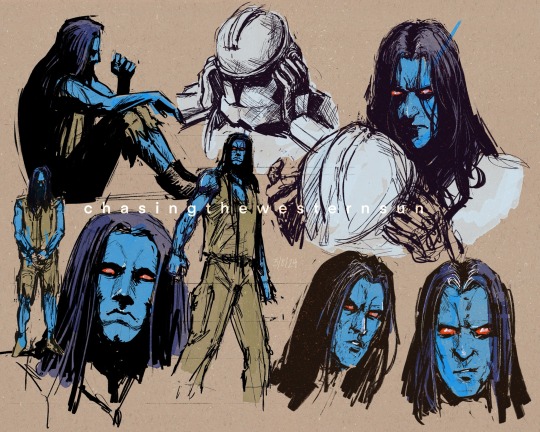



I haven’t been liking how I draw thrawn lately so I wanted to do some comic redraws to practice. Feral Thrawn is so funny to me?? Like why is his hair so long?😭 bruh was only supposed to be out there for like a few months—not years
I also find heavily shadowed forms hard so I wanted to practice that too
#star wars#thrawn#star wars fanart#thrawn fanart#grand admiral thrawn#my art 2024#mitth’raw’nuruodo#myart#digital illustration#comic redraw#thrawn spoiler#idk if referencing his conversation with night swan in my post is a spoiler exactly but ¯\_(ツ)_/¯#why’s his hair so long WTF?#literally did he drink a hair growing potion? do chiss have hair growing potions#😭😭#and no facial hair whatsoever ig looool#I know it’s an artistic decision for the comic but it’s still so funny to me that his hair is so fucking long for like no reason other than#selling that he’s been here for awhile
227 notes
·
View notes
Note
what does it mean when people say stuff like individual morality or action is incompatible with class analysis or class struggle?
alright so like one of the key ideas about class analysis is the idea that classes (as a whole) have economic interests that affect all their members but don't extrapolate out to an individual analysis.
for example, let's say that you can't find a job, and somebody offers to pay you below the table for below minimum wage. it's in your individual interest to do this--it beats having no job! but as a member of the working class, once this practice becomes normalized, suddenly the standards of pay for everyone are lower because people know that they can just pay less than minimum wage under the table. competition between workers for jobs drives wages down for everyone, leaving them all in a worse situation overall even if each individual choice to scab, to accept lower pay, to resist unionization, etc, leaves the person who makes it better off. cf. karl marx on what happens when wages and working conditions deteriorate:
The labourer seeks to maintain the total of his wages for a given time by performing more labour, either by working a great number of hours, or by accomplishing more in the same number of hours. Thus, urged on by want, he himself multiplies the disastrous effects of division of labour. The result is: the more he works, the less wages he receives. And for this simple reason: the more he works, the more he competes against his fellow workmen, the more he compels them to compete against him, and to offer themselves on the same wretched conditions as he does; so that, in the last analysis, he competes against himself as a member of the working class.
— Karl Marx, Wage Labour & Capital
similarly, any individual member of the working class is completely dispensable and replaceable by capital. if one person refuses to work unless they're paid a higher wage, they'll be fired and replaced with somebody who doesn't. the individual worker has no economic leverage whatsoever. but the working class has incredible economic leverage! and so does the intermediate stage between the working class and the individual--organized segments of the working class (e.g. trade unions) have economic leverage. if one person strikes, the capitalist can fire them. if 40,000 people strike, your industry is going to shut down.
so the reason why class analysis is compatible with individual action is that your incentives measurably change when you start organizing--it's in the interests of the individual to compete, but in the interests of the class to cooperate. and obviously you cannot just expect everyone to spontaneously coordinate! you, the individual, are disposable to capital! if you, personally, refuse to take the under-the-table offer, either on moral grounds or because you recognize your class interest, your neighbour's going to take it--unless you and her get together and agree that neither of you will take it. that's the only way that the guy making the offer is going to have to give in and offer the job for a living wage.
and this is what organization is--trade unions (although they have severe limitations!), communist parties, and other worker's organizations allow the working class to pursue their collective interest--which can only be pursued by collective action, because engaging in the strategies of collective action as an individual, without the cooperation of your peers, is high risk for no reward.
#ask#marxism#the effects of electoral politics are far far more limited in scope than trade union activity but the same holds for voting#which is what the original post i was responding to was about#if you 'vote blue no matter who' then the bourgeois party you're showing loyalty to--#--will have no reason whatsoever to even marginally offer to improve your life#and if you as a solitary individual tell joe biden 'well im not voting for you unless you promise so and so social democratic reforms'#he is gonna be like lol lmao dont care#while if you and your several thousand friends all get together and say that#he will at least be obligated to pretend to care before immediately reneging on it bc he ultimately serves capital
853 notes
·
View notes
Text
okay if hatebirds is ash and marcels *duo* name - what uh. what's their ship name, chat? what we got here?
#i wanna have one#i. look i almost asked this for wet birds and im glad i didnt because we got wet bird *however*#for legal reasons i need a ship name#for. no fanfic writing related purposes whatsoever#ashril#marcel julius jones#bound smp#a tag to help find my own posts
54 notes
·
View notes
Text
“you and lucius are going to have a baby,” she spat out, incredulously.
narcissa nodded, a small smile breaking out across her face. “isn’t that terrific news, bella?”
“it is terrible news,” bellatrix replied. “a baby!” she yelled, throwing her arms up in the air, losing her usually cold demeanour. “in the middle of a war! narcissa, have you even thought before?”
she blinked. “we have, in fact,” she said, quietly, “but i would have thought that you, as my sister, would be supportive of what lucius and i decided for our future.”
“cissa,” she hissed, her fingers wrapping around her sister’s arm. “this is one of the worst decisions you have ever, ever made, and you will regret it.”
“i will not!” narcissa whispered angrily, prying her sister’s hand off of her. she wiped her eyes angrily and stormed towards the manor, leaving bellatrix in the cold.
#angst. an anon asked for a continuation of the post and i decided to make it angsty#the reason bellatrix reacts like this is because she doesn’t want narcissa to be unhappy#and risk living an unhappy life (in case lucius ends up in azkaban and narcissa is left with their child and nothing else whatsoever)#anyways!!! angst#bellatrix black#bellatrix lestrange#narcissa black#narcissa malfoy#my writing#bellatrix&narcissa
111 notes
·
View notes
Text
Darling You Will Bury Me (Before I Bury You)
“Your most exalted highness, it is an honour to be able to represent my nation and family by serving a son of the Water Tribe chiefdom. I hope to prove myself equal to the task, and worthy of the trust this great, distinguished nation has placed in me.”
Zuko bows again, lower this time, clearly subservient. It’s like the weight of the moment is physically bearing down on his shoulders; Zuko, the son of a genocidal tyrant, bowing to a man from a race his father tried to annihilate. A prince of the Fire Nation willingly submitting, volunteering to devote his life to the protection of a future chief of the Water Tribes. This is the kind of moment that echoes throughout history.
“…dude.” Sokka’s eyebrow, if possible, jumps higher. “Anyone ever tell you you come on a little strong?”
After an attempt on the future chief’s life by those who oppose the unification of the Water Tribes, it is decided that he, as a non-bender, requires a bodyguard to ensure his safety. A young prince of the Fire Nation is granted the privilege and honour of the task.
Zuko, after about a day and a half spent with Sokka, privately thinks it’s a fucking miracle no one’s tried to murder him before.
#zukka week 2023#zw23#zukka#elle writes things#y’all i have no writing time or free time whatsoever but i keep my fucking promises so.#tosses some bodyguard au at your feet and sprints away#this one’s also for ash who was so nice abt this au and inspired me to get my shit together#which is the only reason i’d already written enough of this to easily post a chapter of it this week
274 notes
·
View notes
Note
How many times did robespierre get an assassination attempts?
Because I remember his sister Charlotte robespierre says in her memoir maybe? That he had multiple assassination attempts not only Cécile-Aimée Renault who tried her luck.
And who is Cécile Renault and what is her story?
Charlotte speaks of attempts on her brother’s life in chapter four of her memoirs:
Since Maximilien Robespierre perished, a victim of counterrevolutionaries, his enemies’ rage has emerged in calumnies, lies, and furious diatribes against him; but before his death, independent of those means which have always suited them, they had another which was no less worthy of them: the dagger. A great number of assassination attempts were made on him. History has spoken of Cécile Renault and of Ladmiral, but it has said nothing of the many other assassins who came to my unhappy brother’s house in the intention of cutting his throat. We were one day gathered at M. Duplay’s house, when a man came and asked to speak to Maximilien Robespierre. My brother went to him and prayed him to say what he wished. That man replied that he could only speak to him in private; he was then shown into a neighboring room where my brother followed him. Some moments later we heard a violent movement. Right away we suspected the unknown man; we entered the room where he was with Maximilien, and we saw that he had seized my brother around the neck, that he had pushed him against the wall, and that he was strangling him!... the assassin was built like Hercules, and had an easy advantage over Maximilien, who was weak bodily and of a delicate complexion. We cried out piercingly; the assassin then let go his victim and took flight; entirely occupied as we were with succoring my brother, we did not think of cutting off his escape. Another time, two men came likewise to M. Duplay’s house to speak to my brother, who had gone out; we told them that he was absent. They insisted on seeing him. There was something suspicious in their countenances, in their miens, and even in their words; everything about them announced their malevolent designs; they were questioned on the object of their visit, and they cut themselves off, which succeeded in confirming our idea that those two men were nothing but criminals, who wanted to assassinate Maximilien. They said that they absolutely needed to speak to him, and that they would return. They did return, in effect, the next day at dinnertime when we were at the table; they did not enter together; perhaps they had made M. Duplay’s house a meeting-place to execute their crime. The first to arrive seemed embarrassed; he asked to speak to Robespierre in private; we replied that their vile plans had been discovered. At these words, he became troubled, mumbled a few words, and retired in all haste. Only a few minutes passed before his companion of the previous evening arrived. He was not given the same to speak; he was told that his accomplice had preceded him by an instant, that there was nothing more for him to do than to join him, and that their attempt had failed. No more was needed to destroy him; one might have called him a man struck by lightning; he fled as if being pursued. These two events, and many others as well, gave Robespierre the certainty that a gang of assassins had been organized to make attempts on his life.
Lucile Desmoulins also mentions an assassination attempt in a diary entry written December 12 1793, when recounting the events surrounding the Insurrection of August 10th four months earlier — ”On August 8, I returned from the countryside. Already the spirits were strongly aroused, someone had wanted to assassinate Robespierre.” While it’s tempting to assume this is one of the attempts Charlotte is describing above, this sounds unlikely to be true considering she hadn’t arrived in Paris by August 8 1792, yet claims to have been an eyewitness. I think it’s also a bit strange how, aside from the testimonies of the two women, we appear to have no other source for/mention of these three assassination attempts. Especially when we know the Cécile Renault one stirred up so many emotions…
As for her story, as told by Histoire du tribunal révolutionnaire de Paris (1880) by Henri Wallon, she lived on rue de la Lanterne (today Rue de la Cité) in Paris with her father and brothers. Acquaintances would later describe her as ”young, lively and nice, [someone who took] pleasure in conversation and loved finery,” and that her reserved father had a constant concern for his daughter. On May 23 1794, at nine o’clock in the evening, Renault presented herself at the Duplay house on Rue de la Saint-Honoré, roughly two kilometers away from her home, and asked to see Robespierre, claiming to have been out looking for him for six hours. When Éléonore Duplay, who had received Renault at the door, told her Robespierre wasn’t home, Renault got surprised and responded ”that he is a public official and therefore should respond to all those who came to his house.” This got her arrested (it is unclear to me whether Éléonore was the one who called for it or not) and sent to the Committee of General Security. On her way there, the three men escorting her reported that ”[Renault] told us that during the l’ancien régime, when one presented oneself at the king’s, one could enter straight away. We asked her whether she would rather have a king, she responded that she would shed all her blood in order to have one and that these were her opinions and that we were tyrants.”
Once arrived at the CGS, Renault was interrogated:
What is your name, age, profession and recidence?
My name is Aimée-Cécile Renault, I’m twenty years old, I live with my father, paper merchant, on rue de la Lanterne, close to rue des Marmousets, in the Cité section.
Where were you arrested and by whom?
I was arrested at Robespierre’s house by men I didn’t know.
What was your motive for going home to representative of the people Robespierre?
To talk to him.
What did you plan to talk to him about.
That depended on whether I found him or not.
Had anyone ordered you to go talk to him?
No.
Did you have anything to present him with?
That’s none of your business.
Do you know citizen Robespierre?
No, that’s why I asked to get to know him.
What was it that determined you to get to know him?
To see if he was OK with me (s’il me convenait).
I ask you to clearly explain what you mean by these words: ”to see if he was OK with me.”
I have nothing to respond. Don’t interrogate me more.
When you presented yourself at citizen Robespierre’s house, did you not express anger over the fact he wasn’t there?
Yes.
Do you know of rue de l’Estrapade?
No, I don’t know of it and I’ve never been there.
Do you know someone named Catherine Théos [sic]?
No.
Do you know an individual by the name of Dom Gerle?
No.
Have you ever heard Dom Gerle or Catherine Théos [sic] speak?
I have never heard anyone speak.
Did you tell the citizens who came to arrest you at citizen Robespierre’s house that if needed, you would spill all your blood in order to have a king?
Yes, I said that.
Do you stand by it?
Yes.
What were the motives which determined and still determine you to desire a tyrant?
I desire a king, because I would prefer that over fifty thousand tyrats, and I only went to Robespierre’s house to see what a tyrant looks like.
When the CPG searched Renault, two small knives were found on her. It was also discovered that, before going to visit Robespierre, she had left a package to one citizen Payen. The package was opened before Renault, and was shown to contain a full set of women's clothing. The interrogation then continued as follows:
What were your intention in providing yourself with these various items?
Fully expecting to go to the place where I would surely be taken, I would be happy to have linen for my use.
What place are you talking about?
About prison, to from there be sent to the guillotine.
What usage were you planning to make of the two knives that were found on you?
Nothing, I wasn’t planning to harm anybody.
Signed: Voulland, Dubarran, Amar, David, Moïse Bayle, Vadier, Élie Lacoste, Lavicomterie, Jagot, Louis du Bas-Rhin. As for her, she refused to sign.
After this interrogation, Renault was sent from the Committee of General Security to the Conciergerie prison. The following day, May 24, she was interrogated by the president of the Revolutionary Tribunal, René-François Dumas:
What is your name, age, profession and recidence?
My name is Aimée-Cécile Renault, I’m twenty years old, I live with my father, paper merchant, on rue de la Lanterne, close to rue des Marmousets, section de la Cité. I have three brothers, one of which, a 32 year old, lives in the same house, and the other two have left, one with the battalions sent to the department of Eure, the other with the first requisition.
Do you have any particular liasions or associations?
No.
Who are the people who visit your father’s house with the most frequency?
Nobody.
What are your opinions on the Republic and the government?
I want a king, because I’d prefer the power to be in the hands of a single person rather than of forty or fifty thousand tyrants.
How can you suppose that the power of the people, exercised through itself, its representatives or its mandataires to be tyrannical?
I don’t want to share my opinions.
Were your opinions inspired by anyone?
No, and I have no accountability.
Have your manifested your opinions in front of anyone?
No.
Have you in the revolution experienced any loss or been forced into any sacrifice that has been able to serve as a pretext for your opinions?
No, I want a king, I don’t have any other motives.
Do you have the hopes of bringing back a king?
Yes, and it doesn’t matter to me which one.
How do you imagiene the royalty could be reestablished?
Through the success of the armed coalition powers.
Do you have any reports or intelligence that put you in a position to base your hopes on the allied powers on something?
No.
Did you intend to contribute to the re-establishment of royalty?
Yes.
How did you intend to contribute?
I would have contributed with financial assistance and by all means that would have been in my power; I would also have contributed, depending on the circumstances, to destroying the government and those who exercise its power.
Have you made any attempt to carry out your plan?
No.
Have you written any anonymous letter against the government, or know anyone who has done so?
No.
Have you presented yourself at the house of any representative of the people?
I presented myself yesterday at Robespierre’s house, around nine o’clock in the evening.
What was your plan in going to Robespierre’s house.
To talk to him in person.
What did you want to talk to Robespierre about?
I don’t want to give any response or explanation regarding this question.
Do you realize that your answers lead one to believe you had the intention of committing a crime, and that you must explain your intentions?
She does not want to explain further, and adds that she intended to ask him for instructions on the situation and the strengthening of the Republic.
Do you realize that your declarations and obstinacy to not want to explain yourself cannot be reconciled with such a plan, which is why I’m again asking you to explain yourself?
She persists in not wanting to answer.
Did anyone propose to you the plan of going home to Robespierre and did you tell anyone about it?
No.
Did you go to Robespierre’s house several times during day?
No.
When you went to Robespierre, did you have with you knives, and of which sort?
I had in my pocket two folding knives, one in tortoiseshell and the other in ivory, both trimmed in silver: the one made of ivory was given to me by my brother in 89, having found it at Prés-Saint-Gervais. The other was given to me by my grandmother three or four years ago. It was loaded with rust; I cleaned it and tried to remove the rust by scraping the blade with another knife, eight or nine days ago. I rarely use it.
Do you regularly carry two knives?
I carry the tortoiseshell one regularly, the ivory one showed up in my pocket, I didn’t know it was there.
When you went home to Robespierre, did you have the intention of using these knives to kill him?
No; that, moreover, we can judge as we please.
When you yesterday left your father’s house, did you tell anyone?
No.
When you left your house, did you carry with you a package containing clothes, and for what purpose had you brought this package?
I had taken this package containing clothes and linen, because I anticipated that by going to Robespierre I would get arrested.
End of the interrogation.
Renault’s house was searched the night between the 23 and the 24. Suspect things found included two paintings “bearing the effigy of the tyrant and his wife” hidden in a cupboard, ”several papers bearing the signs of feudalism” and two national guard rifles belonging to the father and son. Under the bed in Renault’s room was found a banner on which was crown surrounded by fleur-de-lis printed in large size. In her father’s room was also discovered the following letter to his son:
Paris, January 3, Year II of the Republic.
I’ve seen the letter from your good mother, through which you show that the citizens of the province where you find yourself desire that the former king not be condemned to death. As of now, one can’t tell you anything, because nothing is over yet, but I think that, for the sake of the good and calm of the Republic, it would be desired if he was not executed.
Renault.
To M. Renault, corporal at the depot of the Théâtre-Français battalion, garrisoned in Berlemont.
The father was interrogated on the spot and revealed he had three brothers, two sisters, three sons and one daughter ”who left his house on 4 prairial around six in the evening and who he didn’t know the location of.” Soon, both he, his sister and his youngest son were arrested and seals placed on their belongings. Arrest warrants were also issued against the two oldest sons of the family, but with both away in the armies they escaped the fate of their relatives.
The Renaults’ neighbours were interrogated in order to find out more about them. One femme Papin, who made sure to underline she was not close to Cècile, had the following to say regarding her disappearance:
Citizen Renault, instructed of his daughter’s absence, appeared desolute, and went to his place to check if his daughter hadn’t taken anything with her. He came back saying that the trouble which agitated him robbed him of the ability to see if she had taken anything. Renault then closed his boutique and went to his place. [Femme Papin] went home as well, after having checked, by going home to citoyenne Gentilhomme, citoyenne Bouchot and others, that [Cécile] was not in the neigbourhood. She went to bed, and sometime after having fallen asleep, she was woken up by the son Renault who asked her to look after their cat. She accepted this without thinking about any consequences, without suspecting that in this moment, Renault was being put under arrest. The next day, femme Papin’s oldest daughter learned from citoyenne Besençon, baker, of the arrest of father and son Renault, and it was also said that fille Renault, having learned of the arrest of her brother and father, had fled the house to save herself from the same fate. Six o’clock in the morning, she found herself at the house of citoyenne Julles, talking with her about this arrest, when citoyenne Prévôt entered and told them that fille Renault had been arrested as well, and this while having wanted to kill Robespierre.
Femme Papin’s fifteen year old daughter also came forward, explaining that, on May 23:
Leaving her work and passing by Renault’s boutique, fille Renault knocked on the window, invited her in, and gave her the task of handing over 16 sols to citoyenne Julles. Then she chatted with her for about a quarter of an hour after which she went up to her place. Then she came back down and went out, saying she would not come back. Renault’s brother, not seeing his sister return, was worried to the point that he fell ill.
A girl who had come over to the Renault house to buy a pen declared that Cécile had told her that she had just bought a piece of muslin worth 25 livres from a dressmaker by the name of Sonnet, something which the latter’s wife confirmed to be true. The Renault’s maid declared that she had a bundle of Indian fabrics to redo a taffeta dress for Cécile, and Barbe-Françoise-Antonine Cruel, femme Martin, a different seamstress, reported that Renault had ordered a muslin dress made for her in secret, urging her to get it done as quick as possible since she had to attend the wedding of one of her cousins and because she could get guillotined before it. To that, femme Martin had responded that ”when one does no harm, one should fear nothing.” The revelation Renault possessed several expensive garments, along with information she had had contacts with a young man by the name of Admirat, believed to possibly be related to the Henri Admirat who had made an attempt on Collot d’Herbois’ life a mere day before Renault’s visit to Robespierre, were the main topics for the third interrogation with Renault, held on May 25:
What does your father give you in order to provide for your maintenance?
My dad provides for me, but he only gives me 15 sols per week for personal expenses.
Is it your father or you yourself who buys your clothes? Does he give you a lot and does it vary between different seasons?
He gives me that which satisfies me, and he was the one who bought them.
Do you consider that, holding the trust of your father and being the one who keeps the house running, it seems surprising that it was your father who bought your clothes; and that in general, these kinds of purchases are a thing of the past for women?
She persists in her former response.
Did you, a little while ago, buy different outfits, and do you in this moment have different clothes at the seamstresses?
I bought six ells of muslin, 25 livres per ell, from Sonnet, a haberdasher, living opposite my dad, and I owe him the price. I gave an Italian taffeta dress to citoyenne Dematin, seamstress, living on l’Île de la Fraternité, I believe in a street near the barracks, opposite or nearby an apothecary, and whose name I do not know, to make a sheath out of it for me. I also gave her a muslin sheath, and the six ells of muslin already mentioned, with the exception of the portion which was taken from it to make the garnish, by citoyenne Gentilhomme, linen worker, living with my father. I gave a pierrot de taffetas to lengthen my petticoat to my friend citoyenne Petit, living in Marché-Neuf, with a locksmith, on the fourth floor. My dad doesn’t want me to see her often, observing that she since about a year has been married to a chariot adjutant whose name I don’t know.
Do you understand that one cannot be convinced that, receiving only fifteen sols per week from your father, and this according to your own admission, he would provide you with such a big and beautiful wardrobe?
She persists in declaring that it was her father who bought her the various effects, except for the muslin, and adds that she owes citoyenne Petit, from Marché-Neuf, around forty livres.
Can you explain how, having only 15 sols per week to provide for your particular expenses, you intended to pay the six ells of muslin which you just declared to have purchased on credit, without your father's knowledge. Isn’t it obvious that you could not pay the price of this muslin without some other special resources?
The confidence the merchant, or better yet his wife, had in me, determined them to make this supply on credit and have me pay it off when I could, in ten or twenty years. I intended to ask my dad for fifty livres when I found the opportunity and give it to them.
Do you remember that in the interrogation held yesterday you declared that you would provide money to those who would help you in your counter-revolutionary projects to re-establish the monarchy in France?
I remember saying that.
How can you reconcile this offer of relief with the shortage in which you declare yourself to be?
I acknowledge the shortage in which I find myself, but I would have sold my belongings to provide for the expenses of the armies allied against the Republic.
How long has it been since you went to confession?
I have no accountability for this. Moreover, churches and priests were suppressed a long time ago.
Who was your confessor when the priests exercised their functions?
I have never been to confession.
Have you been to the house of any priest after they stopped holding office, and has any priest frequented your father’s house?
No.
Have you, since the supression, been at the house of the priest of la Magdeleine?
No, because I knew he was a firm patriot, and that he didn’t share my opinions.
Have you sometimes gone to the curé of Saint-Landry, or had any relations with him?
No, I don’t know him, I only know his name.
Do you know citizen Admirat, aged 16 or 17, who sometimes came to see the son of widow Joyanvad, marchande épicière, rue de la Lanterne, at the corner of rue des Marmouzets?
I’ve seen him five to six times only, but I have never spoken to him. I’ve seen him at my father’s house, which is next to that of citoyenne Joyanval.
Have you been to café Payen?
I have not gone into the café, but I left my package to citizen Payen and asked him where Robespierre lived. He sent me to the guardhouse of the firefighters, who gave me the adress.
Were you not surprised one wouldn’t give you Robespierre’s adress, and did you tell them you were going to see a man who today was a lot and tomorrow would be no more?
I might have, I don’t remember. But speaking to the fireman, I told him: ”Robespierre is somewhere.” The fireman having answered that he was president of the Committee of Public Safety, I replied ”So a king then?”
Have you considered that the various admissions made by you in the previous interrogations, together with those recorded in this one, announce that your visit to Robespierre had any other aim than that of discussing only government affairs?
She persists in her previous responses in this regard.
Are you on the point of marrying?
No.
When did you become a royalist?
I have always been one.
I ask you again what it was that determined you to go home to Robespierre was and what your plan was.
She persists in her previous responses, and adds that she would not say more about this; that moreover, it is up to us to guess the rest. (6 prairial, 6 o’clock in the morning)
Soon, Renault did however start having a guilty conscience over having denied her faith, and seven o’clock in the evening the very same day she gave the names of the two late priests that had been in charge of her communion to a judge of the tribunal. When asked if she since then had performed any religious act and who the persons who had made her do that were, Renault simply responded that that was a secret and she had nothing more to say.
During the trial of public prosecutor Fouquier-Tinville one year later, the registrar Wolff claimed that Renault was stripped of her own clothes, covered in rags and threatened during her interrogation:
To force her to make the confession that they wanted to extract from her, she was applied to a type of questioning so ridiculous that it should have made the justice system blush. As the taste of this young girl, who was quite pretty, was to be well dressed, she was stripped of her clothes and covered with dirty and disgusting rags, and in this state she was taken up to the council chamber where she underwent a new interrogation and where the same demands and the same threats were made against her; to which she replied the same way she had already done, adding jeers and mockery against the judges who had the pettiness to use such a ridiculous type of question against her. She was threatened with taking her father and her entire family with her if she did not confess to this alleged assassination.
As Renault was being interrogated, the city section where her family lived also carried out an investigation against them, and through it, even more compromising details came floating up to the surface. It was reported that the family, after the overthrow of the monarchy, had had the words ”the nation, the law and the king” on a cartridge box (giberne), words which they at first refused to delete, though they would eventually do so with the ”king” part. Renault’s father, speaking of the murder of Lepeletier in January 1793, was said to have had stated ”Well! One also wants the death of the king, that will cost them dearly,” while his son had openly lamanted the king’s and queen’s imprisonment in the Temple while serving as guard there. His statement had been reported to the rest of the guard unit, but he had ignored it, simply saying that he thought what he thought.
Renault’s three arrested family members — father, brother and aunt — were all interrogated on May 28:
Antoine Renault, 62 years old.
Do you know who the people are that your children frequent and have relations with?
I only know of indifferent relations to neighbors or relatives. A sister of mine, a former nun, called sister gray, came to my house and conferred with my daughter, without me remarking anything in particular between them. Said sister is very attached to religion.
Learning that we were writing down this part of his response, he wanted to cut it out.
Does your daughter have any fanatical prejudices and any passions typical for her age?
I haven’t noticed in my daughter any religious affections, she appears rather indifferent when it comes to this subject. There exists no clue she has any passions, on the contrary, she is watched over and never leaves the house alone, except for when she rarely goes to the market. When she goes out, I always accompany her. I add here that my daughter is very attached to her aunt.
How do you provide maintenance for your daughter?
I myself buy what is necessary for her.
Where were you the fourth (23rd) this month?
I stopped working (j’ai descendu la garde) at two a’clock, I had dinner at my place with my son and daughter. Five o’clock, being on the point of going to bed, my son and daughter engaged me to go out to relax. I did so, carrying with me 25 livres that he owed to a laundress. I returned home at eight o'clock in the evening, where I found my son and the fille Pepin (Papin), both in anguish, and the former troubled because my daughter, who had been gone since six o’clock, had not returned. They told me that before leaving, she had told them to wait for her, that she would return, without saying where she was going. I had as my plan to go see if my daughter was at her aunt’s house, so I left my house, but fearing to meet her on the way, I went inside and went to bed, as did my son, and we got arrested in the night. I don’t know what has become of my daughter since this moment.
He is asked about the small pieces of furniture (petits meubles) that his daughter owned.
I know of scissors, a bad knife with an ivory handle, which was given to her by her brother; another knife with a scale handle, from my dead sister. She does not usually carry them and often has neither.
Do you know what your daughter’s opinion is on the revolution?
She is a good patriot, she loves the republic very much.
Does your daughter miss the tyrant and has she shown that she desires to see a king reestablished in France?
No.
Have you yourself, in your house, sought to inspire your children with dispositions contrary to the Republic and the current government?
No.
One shows him the letter dated January 3 1793 written by him to his son, the two portraits of the king and the queen found, the two small knives, scissors and a case that he recognizes as belonging to his daughter.
He responds to questions asked regarding the denounciations of which he has been the object. He has never heard his daughter talk about Robespierre or her plan.
Does your daughter know how to read and write?
No, moreover, my daughter has so little inclination towards fanaticism that she has never taken what is called first communion, and has never approached a priest to make what is called confession.
The same day, Antoine-Jacques Renault, 31 years old.
Did you know that the paintings were being kept in a cupboard?
Yes.
Have you served as guard at the Temple?
Yes, two times.
He denies the conversation attributed to him by a denouncer. He is asked again if priests came to his house and if they declaimed against the Republic?
No.
Do you know Admirat?
No.
When your sister went out, why were you so worried?
As my sister usually doesn’t go out, I was worried over not seeing her again.
Do you observe that the situation in which you find yourself does not indicate simple concern, but deep affection to dreadful events?
He persists in his answer.
Do you know that your sister planned to assassinate members of the Committee of Public Safety, and were you involved in the plot?
No.
The same day Edme-Jeanne Renault, 60 years, former nun, rue de Babylone, 698.
Do you often go home to your brother, Antoine Renault?
I go there at least once every décade.
Which priests do you know?
I haven’t seen one in two years.
Have you had any particular conversations with fille Renault?
I view her as my niece, without particularities.
Do you know someone named Admirat, and do you know that he was known to your niece?
No.
Did you know about your niece’s plan? Were you an accomplice? Do you know who inspired it? Did conversations hostile to the republic take place in your house?
No.
The same day her three relatives were heard, Renault was her too picked in by Dumas for a fourth interrogation:
Eight days before your arrest, did you not strongly press a seamstress to carry out work that you had given her?
Yes, and these works were garments.
Did you say to this worker that you were in a hurry for these clothes, and that you didn't know what could happen, and that you could get guillotined in eight days?
I may have said that.
How is it that eight days before your arrest, you could foresee that you could get guillotined?
I have no idea.
Did your family know that you were preparing for first communions?
Never.
How did you know that Blondeau, priest of Saint-Denis-du-Pas, died last Pentecost?
It is only too true that the good priest is dead, I do not want to say from whom I learned of his death.
Do you want to declare that it was he who suggest to you the plan that you attempted to carry out?
Nobody did.
Do you often see your aunt, the former nun?
About every fortnight, and not as often as I would have desired.
She doesn’t want to make more declarations.
She declares that she doesn’t know how to sign.
Signed only F. Girard.
Renault was not perceived as some ”lone madwoman” by the authorities. Instead, they viewed her alleged assassination attempt as part of a bigger conspiracy, connected first and foremost to Henri Admirat’s attempt on Collot d’Herbois life one day earlier. Admirat and Renault were in their turn believed to be accomplices of Baron de Batz, a royalist and former member of the National Assembly, who had since turned against the revolution and was currently in hiding. According to letter written by the Committee of General Security to the public prosecutor exactly a month before Renault’s visit to Robespierre, de Batz had tried to rescue the royal family from the Temple by pretending to serve a guard there, tried to rally a mob to save the king on the day of his execution, held an Austrian committee directed by Marie-Antoinette, tried to bribe the authorities, and had contacts with both William Pitt, the Vendée, Toulon, Lyon, Marseille and the émigrés, all with the goal ”to assassinate the national representation, the object of his constant rage.” The letter ended by declaring de Batz was officially outlawed and any means were allowed when it came to capturing him.
In the weeks following Renault’s arrest, she would be joined by more people would said to belong to this alleged conspiracy, among them de Batz’ mistress, lodger and secretary, a domestic and seamstress, a former marquis and his son, a banker, a confident of Fabre d’Églantine and Hérault de Séchelles, parisian prisoners de Batz was believed to have influenced, and even several men currently employed in revolutionary administrations believed to benefit the enemy. On June 14, the Convention unanimously decided to immediately send the total of 40 accused before the Revolutionary Tribunal, following a report on the conspiracy read by the Committee of General Security’s Élie Lacoste (the total number would however have been bumped up to 54 once the trial began). The main objective of the conspiracy had according to Lacoste been ”the abduction of Capet's widow, the dissolution of the National Convention, and finally counter-revolution.”
The trial started on June 17 and lasted only for a few hours (I’ve unfortunately not discovered the minutes for it). All of the 54 accused, with the exception of Admirat, denied having been involved in any assassination plan. That was however not enough to stop the tribunal to sentence every single one of them to death. They were executed at four o’clock the very same day, all dressed in red shirts, which the penal code of 1791 had proclaimed all condemned murderers were to wear.
Though Robespierre never so much as saw Renault or Henri Admirat, the assassination attempts are still often seen as a contributing factor to a decline of his mental health in the last months of his life. Already on May 25, he was the author of the following CPS decree, rather panicky in tone, asking Saint-Just, who was currently away with the armies, to return to Paris:
Dear collegue,
Liberty is exposed to new dangers; the factions arise with a character more alarming than ever. The lines to get butter are more numerous and more turbulent than ever when they have the least pretexts, an insurrection in the prisons which was to break out yesterday and the intrigues which manifested themselves in the time of Hébert are combined with assassination attemps on several occasions against members of the Committee of Public Safety; the remnants of the factions, or rather the factions still alive, are redoubled in audacity and perfidy. There is fear of an aristocratic uprising, fatal to liberty. The greatest peril that threatens it is in Paris. The Committee needs to bring together the lights and energy of all its members. Calculate whether the army of the North, which you have powerfully contributed to putting on the path to victory, can do without your presence for a few days. We will replace you, until you return, with a patriotic representative.
The members composing the Committee of Public Safety.
Robespierre, Prieur, Carnot, Billaud-Varennes, Barère.
The next day, May 26, after Barère in the name of the CPS had read a report to the Convention regarding the assassination attemps (calling Renault ”a royalist as fanatical as the most inveterate of couriers”) and using them as a weapon against the English, Robespierre mounted the roatroom and held a fiery speech — ”calumnies, treasons, fires, poisonings, atheism, corruption, famine, assassinations, have all lavished their crimes; there still remains assassination, and then assassination, and then again assassination.” He appeared at the Jacobins the following day but after that he didn’t speak in public again until June 8, the day of the Festival of the Supreme Being. The Convention deputy Joachim Vilate claimed in the pamphlet Causes secrètes de la révolution du 9 au 10 thermidor (1794) that Robespierre during the last months of his life ”spoke only of assassination, again assassination, always assassination. He was frightened his own shadow would assassinate him. One month before his overthrow I had only set foot in his house and was given worried and threatening looks.”
The assassination attemps are also commonly seen as a contributing factor to the creation of to the Law of 22 Prairial, passed by the Convention on June 10, which Renault and the other accused were also judged under.
#cécile renault#robespierre#frev#french revolution#long post#ask#”i wasn’t gonna harm him but i think he’s a tyrant and i want to see the government overthrown.”#girl what kind of strategy is THAT???#either go all in ”yes i was gonna stab him and i’m proud of it.”#or just go ”oh no i had no evil intentions whatsoever i just always carry knives on me. i ❤️ max!!!#also ”oh no my daughter/sister who never leaves the house alone has left it alone without telling me where and i’m super worried”#”well best just go to sleep and hope she shows up eventually”#like WHO reasons like that????
31 notes
·
View notes
Text
I am never not thinking about Renji giving people rides on Hihiou Zabimaru, but somehow I forgot about the time Rukia used a Hakuren to launch Kon into the air during the kemari episode.

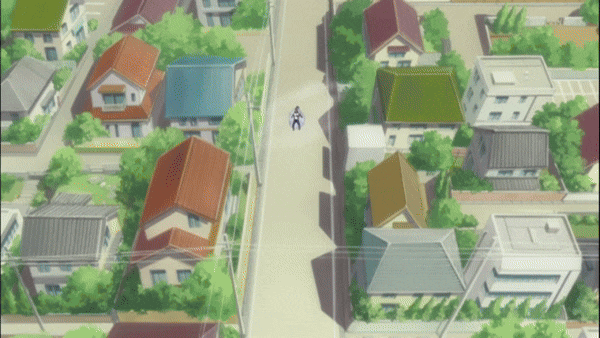
Reader, she was not sorry.

Unfortunately he started to go out of bounds, so Tessai felt it necessary to shoot him down with a Bakudou #99, p2.
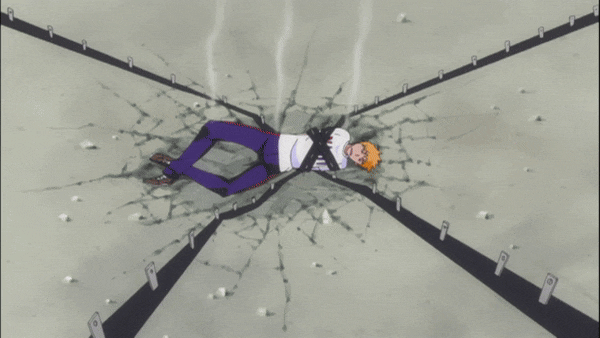

I cannot emphasize enough that this was for a game of kemari to resolve some vague beef Rurichiyo and Kenryuu were having, there were literally no stakes whatsoever to everyone else, who just showed up and chose violence.
#rukia kuchiki#kon#bleach filler#all of the best bleach filler episodes are just ichigo trying to have a normal one while his friends have no chill whatsoever#kon only wanted to be on kenryuu's team so he could play with rukia this is so sad alexa play despacito#i almost posted this as a video#because they are playing 'senna' during this entire bit which is one of the best and most intense pieces of bleach fight ost#also there's a bit where orihime shields ichigo and he yells “THANK YOU INOUE” in exactly the way he yelled “THANK YOU CHAD” that time#but that was getting out of the scope of this post#it was so cute tho#renji and/or hitsugaya should have been in this episode i will never shut up about it#IKKAKU showed up a some point there is no reason we couldn't have had one if not both of our best soccer bros#i tell you rukia is constantly trying to steal renji's moves this is just like the time she blew herself up in the zan rebellion arc#i am sure he approves and supports her in this#it looks cooler when she does them anyway#maybe renji's entire bit is just test-ballooning Stunts for rukia so she doesn't have to embarrass herself on the ones that turn out lame#get you a man etc etc
24 notes
·
View notes
Text

~ Art by Chica Umino
#sangatsu no lion#3月のライオン#march comes in like a lion#I have literally no reason whatsoever as too why I posted this other then this pic going absolutely fucking hard
189 notes
·
View notes
Text
what you’ve got to understand about working conditions in education (and also other care-oriented careers) is that if they’re shit, two things are true at once:
that does not ever excuse being cruel to a kid, no matter what
until those conditions are fixed, education will continue to suck absolute shit
this is because when working conditions for teachers are really bad, many of the good teachers who recognize when they are reaching a point where they can no longer be the sort of teacher the kids deserve due to burnout WILL quit. they will do the responsible thing and go away for their own sake and the sake of the kids. and you end up stuck w a combination of new teachers who are trying their best but won’t last long, burnt out teachers who are trying their best but have nothing left to give and therefore aren’t very effective at actually teaching, and cockroach shitheads who take out their misery on the kids.
we have all had terrible experiences with bad teachers, many of them flat out traumatic, but for fuck’s sake please try to look at the systemic underpinnings of the problem for one minute. spitefully declaring that teachers don’t deserve good working conditions or even the right to complain about bad working conditions because ms. whoever in 5th grade was a bitch is only going to create more of her. if you want good teachers then we need an education system they can survive in
#i get so irritated w the post where like.#95% of it is a good post and then at the end op is like WAAAHHH teachers are complaining about burnout on my post about a bad teacher#like yeah no shit. if the field of education wasnt so hostile to everyone who works in it maybe they could have found a better teacher to#replace that motherfucker with. and then she would not be there to bother the kids any more.#as someone who Has had traumatic experiences w bad teachers.#its scary enough walking into a field i know is pretty much built to chew new teachers up and spit us out#hoping to be able to survive it long enough to do some good and be the kind of teacher i needed as a kid#without people acting as though it is some sort of crime for teachers to want. like. basic human dignity at work and enough money to survive#even people who are nominally pro-workers rights#you guys have no fucking idea how bad the situation is in schools right now#the reason bad teachers didnt get fired perhaps USED to be tenure#but nowadays its the fact that its rare for a school to be fully staffed *at all* bc so many teachers quit or died#so they'll hire and keep absolutely fucking anyone simply because the alternative is No Teacher. and an empty classroom#full of kids who wont learn anything except that the system doesnt even care about them enough to put a teacher in the room.#i have gotten job offers ON SIGHT from principals who know nothing about me and im literally not even legally qualified to teach yet#like before even telling them my name lmao#and im sure everyone else in town who expresses any interest in teaching whatsoever gets the same.
157 notes
·
View notes
Text

#911#911edit#evan buckley#buck#my edit#heres a gif for no reason other than ive been coloring this for an hour for no reason whatsoever#and i feels like a waste of time if i don't post it lol#i dont love it yet#i think there's still room for improvement#but i cannot look at this buck anymore today#so mission for future anna#911verse
37 notes
·
View notes
Note
Really love your sunfish post, I'm reminded of how everyone thought blob fish were sooooo ugly because the only photo we had was of a blob fish looking messed up from rapid depressurization when they really just look like cute bumpy fish when observed at the depth they live at.
Why thank you! It's a shame what that single image did to the blobfish :( Fishblr communities know better, I imagine, but in popular media blobfish are, still, shown as pink sad blobs. The fish often seen in posts that debunk the claim are a different species to the one from the infamous picture, but they're still pretty ordinary fish.

Ah, I don't know if it's something weird with me but I really do not see a point in making fun of an animal's appearance. Playful jabs are just playful, sure, but... do some people really hate an animal just for how it looks? That's it? That's all? That is the only reason you dislike it? Its value is less for its looks? I've definitely most certainly called animals ugly in my lifetime, but, now in my current stage of life, it's a bit... ehhh...
#youve heard of ranch's hot takes. now get ready for: ranch's cold takes#i mean. you heard me in my various sunfish posts. you can despise an animal for any reason ever!#even for the stupid ones! sure why not. fuck it up.#i just see no point in it whatsoever? im definitely in the minority here though#continuing my crusade to stop all fun forever /j#asks#polychaeteworm
30 notes
·
View notes
Text
AS OF EPISODE 5, LOGIC IS STILL UNACCOUNTED FOR IN THE CITY OF MENTOPOLIS!
#ATTENTION: IM STILL REALLY CONCERNED ABOUT THIS#imagine it turns out to not be anything whatsoever#dimension 20#Mentopolis#mentopolis spoilers#Likely not working with Fawn as my last theory states#hmm would logic work with flight? why would flight steal attentions key if he has her own?#would logic have reason to steal the other keys? logic prob has their own key right? god and what would logics motive be now?#I’ll prob write a longer post going into episode five questions and theories
23 notes
·
View notes
Note
griffin loves nature in general, plants and animals, after meeting finney he has taken a liking for astronomy too
sweet summer curious child who loves learning
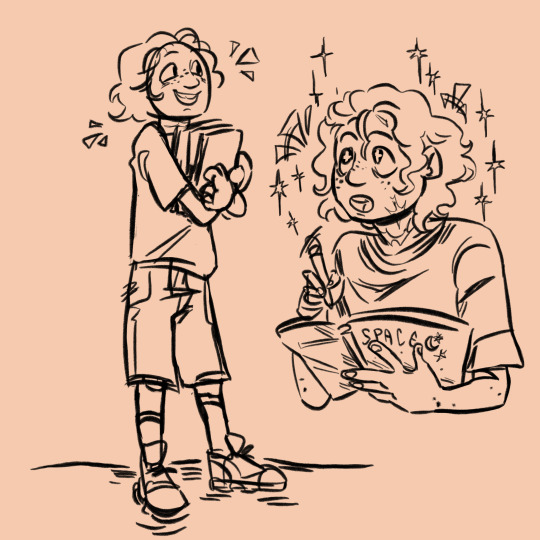
He is a very smart boy who soaks up knowledge like a sponge, and it’s almost intimidating for a lot of his peers
But to Griffin it’s an achievement, that he can remember so much stuff about plants, animals, and now space!
Additional star gazing Finn and Griff content!!!

#pippi art#the black phone fandom#the black phone#finney blake fanart#tbp griffin fanart#griffin stagg fanart#tbp finney fanart#necromancer finney au#Griffin Blake#I’m making that a tag because he’s a Blake now#hc that griffin had a photographic memory and was so frustrated and upset when he started loosing his memory when he died#his memory is kinda shitty post revival but he copes with writing it down#never leaving his book for any reason whatsoever#I love griffin he’s literally babey#my favorite character ever#btw thank you for sending this in btw!!!
73 notes
·
View notes
Text
anyway if you're having some uncomfy feelings about posting unsourced art/photos in the past because of that post i made about how to identify stolen images, maybe hunting through my blog for any possible whisper of hypocrisy is not the most productive place to direct that energy. i'm not here to shame anyone, just to provide information on how to make this website a little friendlier to artists by discouraging sourceless uploads. lack of engagement on unsourced posts will cause most uploaders to change their behavior for the better.
#i'm pretty sure this is the reason i got that anon lol#very funny to me that most of this website is so 'art theft bad' when it comes to ai image generation#but posting entire artworks with no credit or reference to the artist whatsoever is totally fine and normal#and it's not like it's the end of the world - there are bigger issues out there to worry about for sure#this is just a very small thing that absolutely anyone can do to make the culture here just a little better#this will be my final commentary on the matter#further anons will be ignored go bother someone else
8 notes
·
View notes